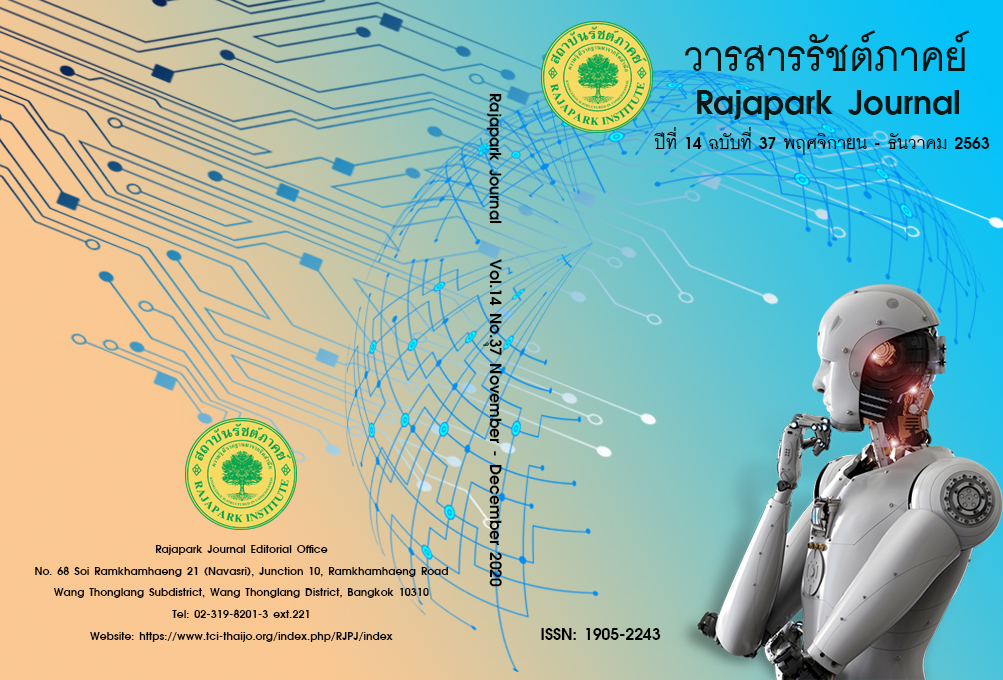Development of a 2D Pixel Art Game Lesson on Matrix
Main Article Content
Abstract
The objectives of this research were 1) to develop the courseware of a 2D Pixel Art Game Lesson on Matrix, 2) to evaluate the efficiency of this courseware, 3) to compare the achievement of learner before and after learning with this courseware, and 4) to study the satisfaction of learner after learning with this courseware. The research tools were 1) the courseware of a 2D Pixel Art Game Lesson on Matrix, 2) the pre-test and post-test, and 3) the questionnaire to evaluate the satisfaction of learner. The sample was selected using simple random sampling consisted 30 students from majoring in Multimedia Technology, Nakhon Pathom Rajabhat University. Creating the courseware and game by pixel art pictures with the content related about Addition, Subtraction and Multiplication of Matrix, collect data in the classroom. The statistics used for data analysis were mean, standard deviation, and t-test dependent samples. The results were 1) the efficiency of this courseware was at 1.34 according to the Meguigans criteria, 2) the learning achievement of learners after studying higher than before, and 3) the satisfaction of learner was at high level.
Article Details
Views and opinions appearing in the Journal it is the responsibility of the author of the article, and does not constitute the view and responsibility of the editorial team.
References
Chotirut, S. (2019). Blended Learning Approach and Motivating in Learning by Integrated Gamification in Data Structure and Algorithm Course. Academic Services Journal, Prince of Songkla University, 30(2), 69-79.
Daungtod, S., Nilsook, P., & Wannapiroon, P. (2014). Development of Computer Games for Teaching Computer Courses Integrate Mathematics. Technical Education Journal King Mongkut’s University of Technology North Bangkok, 5(1), 117-125.
Ke, F. (2016). Designing and integrating purposeful learning in game play: a systematic review. Educational Technology Research and Development, 64, 219-244. https://doi.org/10.1007/s11423-015-9418-1
Khammanee, T. (2014). Teaching Science: Knowledge for the effective learning management (10th ed.). Bangkok: Chulalongkorn University.
Ministry of Education. (2002). National Education Act B.E. 2542 Amendment (No. 2), B.E. 2545. Bangkok: Express Transportation Organization of Thailand.
Nakasan, N., & Nakasan, C. (2016). Game: Innovation for Creative Education. Romphruek Journal Krirk University, 34(3), 159-182.
Pheeraphan, N. (2016). Studio TEACH for Pre-Service Teacher Development in the 21st Century. Journal of Behavioral Science, 22(1), 1-16.
Pramornpathomkul, R. (2015). The Development of Computer-Assisted Instruction (CAI) Games for Teaching Addition and Subtraction of Integers to Grade 3 Students with Attention Deficit Hyperactivity Disorder (ADHD). Master of Education Department of Educational Technology and Communication. Faculty of Education, Rajamangala University of Technology Thanyaburi.
Sikkhabhandit, S. (1985). Educational Technology. Bangkok: King Mongkut's University of Technology North Bangkok.
Tiantong, M. (2011). Courseware design and development for CAI. Bangkok: King Mongkut's University of Technology North Bangkok.
Yamkuan, L., & Niwattanakul, S. (2017). The Using of Game-Based Learning for Promote Mathematics Process Skills of 6th Grade Students. Journal of Information Science and Technology (JIST), 7(1), 33-41.


